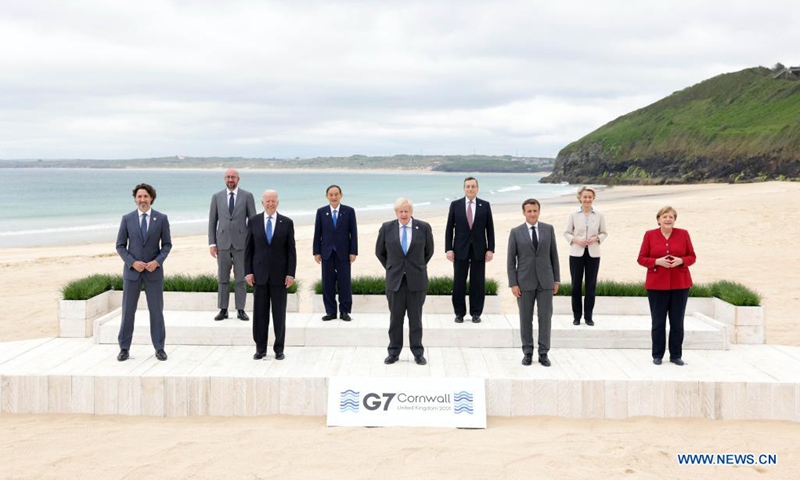
(From L to R, Front) Canadian Prime Minister Justin Trudeau, U.S. President Joe Biden, British Prime Minister Boris Johnson, French President Emmanuel Macron, German Chancellor Angela Merkel, (From L to R, Rear) European Council President Charles Michel, Japanese Prime Minister Yoshihide Suga, Italian Prime Minister Mario Draghi, and European Commission President Ursula von der Leyen, stand for a family photo during the Group of Seven (G7) Summit in Carbis Bay, Cornwall, Britain, on June 11, 2021. Photo:Xinhua
The Group of Seven (G7) summit ended on Sunday. After the meeting, the countries issued a communiqué, which openly criticized China and mentioned issues related to China's Xinjiang, Hong Kong and Taiwan. The communiqué also mentioned opposition to "forced labor" and "unilateral attempts to change the status quo" in the East and South China Seas.
Attitudes were expressed in different degrees of tone. Some directly named China. Others made implications without calling China's name directly, but made the country the unmistakable target. This has been the most systematic condemnation against China and interference in the country's affairs by major Western powers.
The US apparently dominated the attitude of its allies. The G7 leaders called "for a timely, transparent, expert-led, and science-based WHO-convened Phase 2 COVID-19 Origins study, including, as recommended by the experts' report, in China," the communiqué said. Almost every issue on which Washington has recently attacked China has been mentioned in the communiqué. On the other hand, the language of the communiqué was somewhat softer than previous Washington slanders against China.
For example, much of the fiercest US rhetoric against China has been directed at issues over Xinjiang and Hong Kong, including accusations of "genocide" in the Xinjiang Uygur Autonomous Region. However, in the communiqué, it says that "we will promote our values, including by calling on China to respect human rights and fundamental freedoms, especially in relation to Xinjiang and those rights, freedoms and high degree of autonomy for Hong Kong enshrined in the Sino-British Joint Declaration and the Basic Law."
All this demonstrates that the US may have the ability to drive major Western countries to form a collective tone against China, but it is unable to impose its most extreme views as G7's uniform outlook or the West's in general. CNN reported that the seven leaders aired serious differences over how best to approach China during a session of the G7 summit. German, Italian and European Union leaders in particular, opposed dealing with China in a confrontational manner. The final communiqué was clearly a product dominated by Washington, yet was a compromise by all.
This should be seen as a fruitful start for the US to rally its allies against China. It foreshadows the future of greater pressure on China's diplomacy from the US through Western platforms. It is anticipated that Washington will make more efforts to make its crackdown on China look like a Western coordinated move, and the possibility of other Western countries directly or tactfully supporting its future anti-China policies will increase.
But China doesn't need to be intimidated by such a scenario at all. In fact, the West has mostly been "united" when it had conflicts with China in the past over ideological issues such as human rights. The US and its allies have strengthened their coordination, but it is all focused on public opinion and diplomacy, and transforming that into a unified hostile action against China remains difficult. The G7 leaders' communiqué gave no hint of a breakthrough on this front.
This shows that the interests of the US and its allies on the issue of China are very different. The US has a strategic plan to maintain its hegemony and wants the West to bring China down together. European countries have ideological differences with China but their economic relations with China are not only competitive but also have strategic needs for cooperation. The strategic differences between the US and Europe on China are insurmountable.
China should not have any illusions toward the US, but it must differentiate other countries from the US. Regardless of what kind of "anti-China united front" the US may present on the surface, we should all be clear that such a "united front" is weaker than it looks. The pattern is certain that the US is serious but the European countries are perfunctory to it. China has the big room to fundamentally thwart this "united front" between the US and Europe, and eventually win the tug-of-war to dissolve it.
Stepping outside of the West, it is harder for the US to establish a "united front." It has been more of a political performance of the US to advocate international morality. For example, the US pushed the G7 countries to launch an infrastructure construction plan to counter the Belt and Road Initiative, but it is questionable whether it can really be carried out or achieve practical results. The US is competing with China using a Cold War mentality. But in fact, it is falling into disarray, using its weak points to compete with China's advantages.
As long as China manages its own things well and develops normal relations with other countries, it will be able to defeat the US plot. Washington will need to work very hard to achieve this — apart from pressuring allies and dragging them to work against China, it also needs to do things that it would not be interested in doing if it were not trying to get China into trouble. Time will wear down the scheme of the US. If China is steadfast on its own, there is no need to push or trip it up, as the US will stumble on its own.




